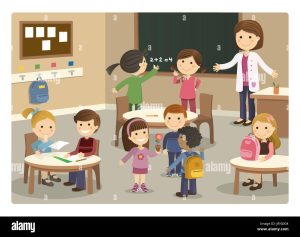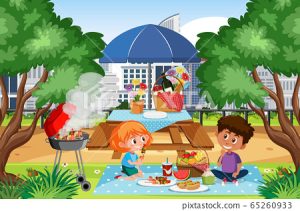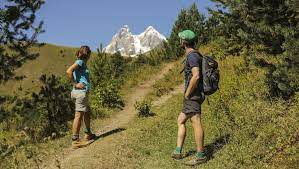5 Module 5- Las vacaciones
Vocabulario- Las vacaciones, los meses, las estaciones, el tiempo
Antes de viajar- las preparaciones |
Before traveling- preparations |
| hacer las reservaciones/las reservas (Spain) | to make reservations |
| hacer una búsqueda en línea | to make an online search |
| hacer una lista | to make a list |
| los lugares preferidos | preferred places |
| alquilar/rentar un auto | to rent a car |
| reservar un asiento | to reserve a seat |
| escoger un hotel | to choose a hotel |
| escoger un alquiler vacacional | to choose a vacation rental (Air BnB, etc) |
| usar el app | to use the app |
| hacer las maletas | to pack the suitcases |
| usar un sitio web | to use a website |
| conseguir un pasaporte | to get a passport |
| Me gusta quedarme en | I like to stay at |
| el viaje | the trip |
| el enlace | link |
| un pasaje de ida y vuelta | a round trip ticket |
| un pasaje de ida | one way ticket |
| el boleto | ticket (plane, bus, etc) |
| un hotel de cinco estrellas | a five star hotel |
| una habitación | a room |
| el precio más bajo | the lowest price |
| económico/a | economical |
| barato/a | inexpensive, cheap |
| caro/a | expensive |
| lujoso/a | luxurious |
Lugares y modos de transporte |
Places and means of transportation |
| el aeropuerto | the airport |
| la estación de autobuses | bus station |
| la estación de trenes | train station |
| el metro | metro/subway |
| el viaje compartido | rideshare (Uber, etc) |
| viajar en avión | to travel by plane |
| viajar en tren | to travel by train |
| viajar en autobús | to travel by bus |
| ir en taxi | to go by taxi |
| utilizar el viaje compartido | to use rideshare |
| subir el equipaje | to load the luggage |
| facturar el equipaje | to check bags |
| escribir la dirección | to write the address |
| imprimir los pasajes | to print the tickets |
| esperar en línea (hacer cola- Spain) | to wait in line |
| pasar por el control de seguridad | to pass through security |
| la etiqueta | baggage tag |
| la puerta de embarque | airline/train gate |
| el mostrador | ticket counter |
| el/la agente de aerolínea | airline agent |
| el/la agente de seguridad | security agent |
| ser paciente | to be patient |
| tener paciencia | to have patience |
Durante las vacaciones |
During the vacation |
| descansar | to rest |
| ir a | to go to |
| el hotel | the hotel |
| un restaurante | a restaurant |
| un café | a coffee shop |
| la playa | the beach |
| las montañas | the mountains |
| un club | a club |
| un museo | a museum |
| la ciudad | the city |
| el lago | the lake |
| el campo | the countryside |
| un pueblo | a town |
| hacer turismo | to do touristic activities |
| hacer un recorrido | to take a tour |
| sacar fotos | to take photos |
| subir una foto a | to upload a photo to (social media) |
| publicar a | to post to (social media) |
| tomar el sol | to sunbathe |
| nadar en la piscina | to swim in the pool |
| nadar en el océano | to swim in the ocean |
| pescar | to fish |
| pasear en la playa | to walk/stroll on the beach |
| ver los lugares turísticos | to see touristic sites |
| ver el paisaje | to see the countryside |
| ver las ruinas | to see the ruins |
| divertido/a | fun |
| aburrido/a | boring |
Los meses, las estaciones, el tiempo |
Months, seasons, weather |
| enero | January |
| febrero | February |
| marzo | March |
| abril | April |
| mayo | May |
| junio | June |
| julio | July |
| agosto | August |
| septiembre/setiembre | September |
| octubre | October |
| noviembre | November |
| diciembre | December |
| El primero de enero | The 1st of January |
| El dos de marzo | The second of March |
| El treinta de mayo | The 30th of May |
| ¿Qué día es? | What day is it? |
| ¿Cuál es la fecha de hoy? | What’s today’s date? |
| Es el dos de mayo. | It’s May 2nd. |
| Las estaciones | seasons |
| el invierno | winter |
| la primavera | spring |
| el verano | summer |
| el otoño | fall, autumn |
| la temporada/la estación seca | dry season |
| la temporada/la estación lluviosa | rainy season |
| El tiempo | The weather |
| ¿Qué tiempo hace? | What’s the weather? |
| Hace (muy) buen tiempo. | It’s (very) good weather. It’s (very) nice out. |
| Hace (muy) mal tiempo. | It’s (very) bad weather. It’s bad out. |
| Hace (mucho) frío. | It’s (very) cold. |
| Hace (mucho) calor. | It’s (very) hot. |
| Hace (mucho) sol. | It’s (very) sunny. |
| Hace (mucho) viento. | It’s (very) windy. |
| Está nublado. | It’s cloudy. |
| Está despejado. | It’s clear. |
| Nevar (ie) | to snow |
| Llover (ue) | to rain |
| Nieva | It snows |
| Llueve | It rains |
| Está nevando | It’s snowing |
| Está lloviendo | It’s raining |
Quizlet for los meses, las estaciones, el tiempo
Expressing obligations: Hay que, Es necesario, es importante
Ejercicios de práctica
Ejercicio 1- Las obligaciones
Use the expressions “Es necesario, Es importante, Hay que” to describe what is necessary/important to do in the following situations:
-
- Quieres hablar español con fluidez (fluently)
- Quieres viajar a España.
- Tienes un examen mañana en la clase de español.
- Quieres conocer (meet) a una persona especial.
- Quieres tocar un instrumento (play an instrument)
- Estás enfermo/a (sick)
- Quieres ser artista.
- Quieres preparar una cena grande.
- Quieres un trabajo muy bueno que paga un salario muy bueno.
El presente progresivo
ejercicios de práctica
Look at the following pictures and say what people are doing in that scene or situation, using the present progressive.







Ejercicio 2- ¿Dónde estás y qué estás haciendo?
Tell where you are and what you are doing at the following times. Follow the model.
Modelo: 6:00 AM- A las seis de la mañana estoy en mi casa. Estoy durmiendo.
-
-
- 3:00 PM
- 9:30 AM
- 1:00 PM
- 9:00 PM
- 5:00 AM
- 5:00 PM
- 10:30 PM
-
Saber and conocer
Ejercicios de práctica
Ejercicio 1- ¿Saber o conocer?
Work with a partner to decide between either saber or conocer to complete the following sentences. Use the present tense to conjugate the verb forms. Then discuss what the sentences mean.
-
- Mi amiga Paulina ______ cocinar muy bien.
- Yo no ______ quién es el presidente ahora.
- Mis amigos ________ el centro muy bien y ellos ________ dónde están los buenos restaurantes.
- ¿________ tú dónde está el cine?
- ¿__________ al profesor de la clase? (tú)
- Roberto no _______ si puede venir a la fiesta este fin de semana.
- Yo no _______ a Roberto muy bien.
- Carlos y Felipe ______ que es difícil hablar una segunda lengua (2nd language) muy bien.
- Todos nosotros ________ ese restaurante. Ellos tienen comida muy deliciosa.
- Yo no ______ cuándo termina la clase.
Ejercicio 2- Preguntas personales
Work in groups to ask and answer the following questions in complete sentences.
-
- ¿Sabes hablar español? ¿Sabes bailar el tango?
- ¿Sabes quién es el presidente de los Estados Unidos? ¿De Venezuela? ¿De México?
- ¿A quién conoces en la clase?
- ¿Conoces un país hispano?
- ¿Sabes cuándo es el día de independencia de México?
- ¿Qué lenguas sabe hablar el profesor?
- ¿Sabes un poco sobre un país hispano? ¿Qué sabes?
- ¿Sabes los números de teléfono de tus amigos, o no?
acabar de + infinitive
ejercicios de práctica
Ejercicio 1- ¿Qué acaban de hacer?
Look at the following pictures and with a partner determine what the following people have just done, using acabar de + infinitive. You can use any of the subjects with any of the pictures to form a complete sentence. There are many possible answers for each picture. Be creative and be prepared to share your answers with the class.
Subjects: Yo, El profesor, Mi mejor amigo/amiga, Mis amigos, Mi familia y yo






